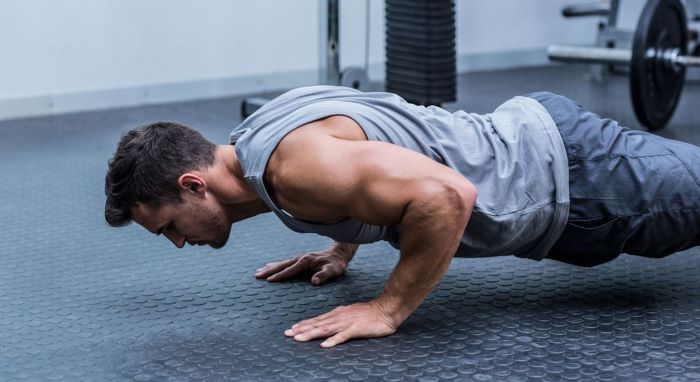
When I first started my journey to becoming fit, I never imagined how transformational bodyweight exercises could be. Being someone who’s fixed machines and heavy equipment for years, the idea of achieving strength without any external load seemed implausible. But as I delved deeper into the mechanics of bodyweight training, I discovered its immense potential. In today’s article, I’m going to unravel the magic behind these workouts and share how you can harness your body’s own weight for incredible strength.
The Power of Bodyweight Exercises

Before diving deep, let me clarify a misconception. When I mention bodyweight exercises, most people think of push-ups and squats, and while these are foundational moves, the realm goes way beyond. When appropriately done, bodyweight exercises can be just as, if not more, effective than weight lifting. Wondering why?
- Versatility: These exercises can be done anywhere, anytime. No need for a fancy gym membership or equipment.
- Functionality: It enhances functional strength, the kind you use in daily activities. Remember the time you had to lift that heavy water can? That’s functional strength.
- Safety: The risk of injury is significantly reduced as there’s no additional weight putting undue stress on your joints.
Now, if you’re a fellow over forty like me, and you’re thinking, “Is it too late for me?”— absolutely not! I came across a fantastic resource, the bodyweight challenge review, that breaks down a precise fitness system specifically designed for men in our age group. What’s more? It guarantees visible results week by week.
The Key Bodyweight Exercises
Let’s delve into some essential bodyweight exercises that can be incorporated into your daily routine:
- Push-Ups: Great for building upper body strength. Focus on your form, and over time, you can experiment with variations to target different muscle groups.
- Squats: The king of lower body exercises. Helps in strengthening your thighs, buttocks, and even your core.
- Planks: Ah, the core burner! Planks are excellent for building endurance and strengthening the entire core region.
- Lunges: Another lower body powerhouse. It not only strengthens your legs but also helps in improving balance.
- Pull-Ups: The ultimate test of upper body strength. It’s challenging but highly rewarding.

But remember, it’s not just about the exercise. The key lies in the execution. Maintaining proper form and gradually increasing intensity is the way to see genuine results. And as I learned from this insightful piece, age shouldn’t be a barrier. Instead, it’s about adapting and evolving our fitness approach as we grow older.
Mindset and Recovery

While exercises form the crux of any fitness regimen, mindset and recovery are equally crucial. It’s essential to stay committed, consistent, and optimistic. At times, especially when starting, you might feel aches and discomfort. It’s your body’s way of adapting. It’s vital, however, to differentiate between a ‘good’ pain, like muscle soreness, and a ‘bad’ pain stemming from an injury.
When it comes to recovery, don’t underestimate the power of good nutrition and adequate sleep. Both are indispensable for muscle recovery and overall well-being. For those pushing their limits, incorporating additional recovery tools like CBD can be beneficial. While I was skeptical initially, after reading this article, I understood its potential in aiding post-workout recovery.
In Conclusion
Strength isn’t just about lifting heavy weights. It’s about harnessing the power within, understanding our body’s capabilities, and pushing its boundaries. As someone who’s ventured deep into the world of bodyweight training, I can vouch for its efficacy. It’s transformed not only my physique but also my perception of strength. So, the next time you’re thinking of hitting the gym, maybe give bodyweight exercises a shot. Your body might surprise you!
The Psychological Benefits of Bodyweight Training
A commonly overlooked aspect of bodyweight training is its impact on mental well-being. When we train our body, especially using its own weight, we cultivate a stronger mind-body connection. This heightened awareness can lead to improved concentration, resilience, and a better understanding of our body’s signals. Additionally, the consistent practice of bodyweight exercises, like all forms of exercise, triggers the release of endorphins. These are our body’s natural mood elevators, reducing feelings of stress, anxiety, and depression. Over time, as you achieve small milestones in your training—whether it’s a few more push-ups or a longer-held plank—you’ll also build confidence and self-esteem. The journey to physical strength, in this way, paves the path to mental fortitude.
Importance of Flexibility in Strength Training

Flexibility might not be the first thing that comes to mind when discussing strength, but it’s a pivotal component of a holistic training regimen. By maintaining and improving flexibility, we ensure our muscles are elastic and pliable. This not only enhances performance but also reduces the risk of injuries. Think of it like this: a rubber band that’s been warmed up and stretched is less likely to snap than one that’s cold and rigid. Similarly, flexible muscles can bear the stresses of exercise better. Integrating stretches or practices like yoga into your bodyweight routine can enhance muscle function, improve alignment, and aid in the overall effectiveness of your workout.
Incorporating Intuition into Your Training
In today’s world of fitness apps, trackers, and wearables, we’re constantly bombarded with data. While these tools can be beneficial, it’s equally important to tune into our body’s intuitive signals. This means listening to your body and adjusting your workout intensity based on how you feel on a given day. Some days, you might have the energy to push harder and challenge yourself, while on others, a gentler routine might be more appropriate. Recognizing the difference between genuine fatigue and mere laziness is essential. By incorporating intuition into your training, you ensure that your regimen is sustainable in the long run, reducing burnout and fostering a more harmonious relationship with exercise.
